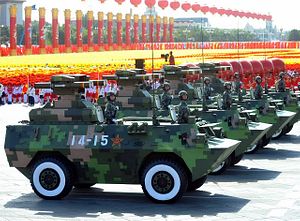China unveiled new details this week regarding its September 3 military parade, which will take place as part of China’s commemoration of the end of World War II. It will be the first time a parade is held to correspond with the anniversary of Japan’s surrender. Details emerged at two recent press conferences – a presser specifically dedicated to the parade held by the State Council Information Office on Tuesday, and a regular monthly briefing at China’s Ministry of National Defense on Thursday.
Among the details was confirmation that China would invite foreign troops to participate in the parade. Russia did the same at its Victory Day parade in May; Chinese troops took part along with troops from Azerbaijan, Armenia, Belarus, Kazakhstan, Kyrgyzstan, Tajikistan, India, Mongolia, and Serbia. China wants its parade to have a similar international flair. “It’s the first time to invite the foreign troops to participate. We hope through this year’s military parade… China and the world can be connected and the message of peace and development can be sent,” one of the parade’s organizers, Qu Rui, said.
Chinese officials have kept news about which exact countries have been invited to participate close to the vest. Defense ministry spokesperson Yang Yujun did confirm on Thursday that both Russia and Mongolia, at least, would send troops to participate in the parade. Chinese officials previously said that they also plan to invite a number of world leaders, including those from the combatant countries, to attend.
China has also invited veterans from the Kuomintang (KMT), which governed the country during the war, to participate in the parade. “KMT troops played an important role in the Chinese People’s War of Resistance against Japanese Aggression,” Qu said at the Tuesday press conference. A spokesperson for the Taiwan Affairs Office clarified that this does in fact mean veterans from Taiwan – and not just KMT veterans still living on the mainland – will be welcome to attend the celebrations. Spokesperson Ma Xiaoguang explained that the victory over Japan was “owned by the entire Chinese nation.”
Taiwan’s KMT and the Chinese Communist Party (CCP) often compete over who should get the lion’s share of the credit for Japan’s defeat. Taipei also plans to host its own military display, in part to help remind the world of the role the KMT played in the war. Meanwhile, the CCP is equally sensitive to accusations that it largely sat out the fighting, saving its strength for the civil war that would follow. During the press conference on Tuesday, a Chinese official took time to chide Western countries for having “belittled the CCP’s role in fighting Japanese Fascists through guerrilla wars.”
During the parade, Chinese President Xi Jinping will give medals to war veterans or their representatives, including the relatives of veterans who have passed on. Sun Chunlong, the head of a charitable foundation focusing on veterans, told Xinhua he had given authorities a list of 7,000 veterans. “Almost 10 veterans pass away every day. For many of them, this year may be the last anniversary they see,” Sun said.
For military buffs, the most exciting news may be that China’s parade will showcase mostly indigenous weaponry that is currently in active service, including many weapons systems on public display for the first time.

































